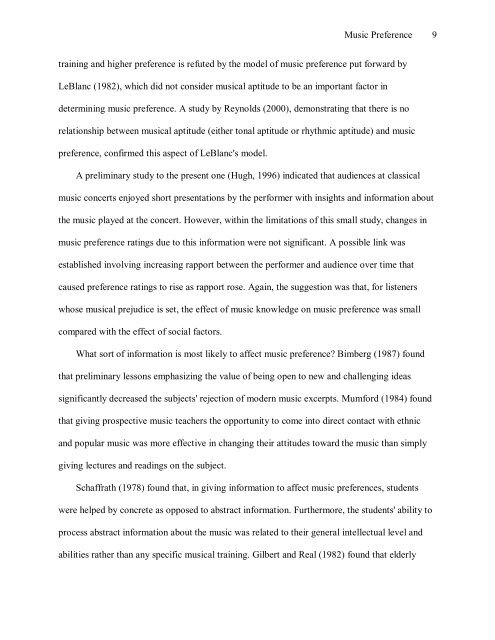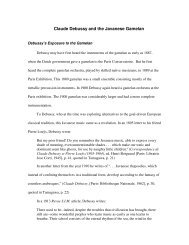Music Preference 1 - Brent Hugh's personal and business web pages
Music Preference 1 - Brent Hugh's personal and business web pages
Music Preference 1 - Brent Hugh's personal and business web pages
You also want an ePaper? Increase the reach of your titles
YUMPU automatically turns print PDFs into web optimized ePapers that Google loves.
<strong>Music</strong> <strong>Preference</strong> 9<br />
training <strong>and</strong> higher preference is refuted by the model of music preference put forward by<br />
LeBlanc (1982), which did not consider musical aptitude to be an important factor in<br />
determining music preference. A study by Reynolds (2000), demonstrating that there is no<br />
relationship between musical aptitude (either tonal aptitude or rhythmic aptitude) <strong>and</strong> music<br />
preference, confirmed this aspect of LeBlanc's model.<br />
A preliminary study to the present one (Hugh, 1996) indicated that audiences at classical<br />
music concerts enjoyed short presentations by the performer with insights <strong>and</strong> information about<br />
the music played at the concert. However, within the limitations of this small study, changes in<br />
music preference ratings due to this information were not significant. A possible link was<br />
established involving increasing rapport between the performer <strong>and</strong> audience over time that<br />
caused preference ratings to rise as rapport rose. Again, the suggestion was that, for listeners<br />
whose musical prejudice is set, the effect of music knowledge on music preference was small<br />
compared with the effect of social factors.<br />
What sort of information is most likely to affect music preference? Bimberg (1987) found<br />
that preliminary lessons emphasizing the value of being open to new <strong>and</strong> challenging ideas<br />
significantly decreased the subjects' rejection of modern music excerpts. Mumford (1984) found<br />
that giving prospective music teachers the opportunity to come into direct contact with ethnic<br />
<strong>and</strong> popular music was more effective in changing their attitudes toward the music than simply<br />
giving lectures <strong>and</strong> readings on the subject.<br />
Schaffrath (1978) found that, in giving information to affect music preferences, students<br />
were helped by concrete as opposed to abstract information. Furthermore, the students' ability to<br />
process abstract information about the music was related to their general intellectual level <strong>and</strong><br />
abilities rather than any specific musical training. Gilbert <strong>and</strong> Real (1982) found that elderly





